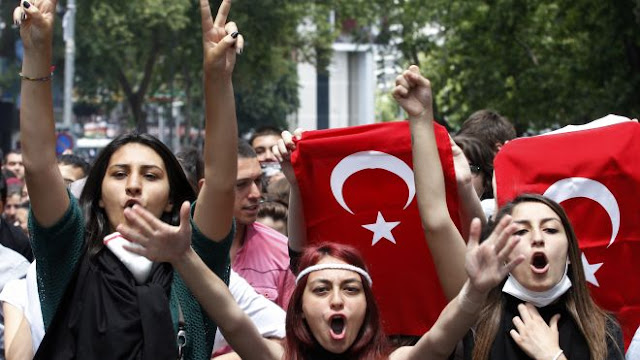Keeping Islamism at bay is not a reason to support dictators
One interpretation of the anti-government
demonstrations now roiling Turkish cities is that they are a massive
protest against political Islam. What began as a rally against official
plans to raze a small park in the center of Istanbul
to make way for a kitschy shopping mall quickly evolved into a
conflict of values.
The fight appears to represent two different
visions of modern Turkey — secular versus religious, democratic
versus authoritarian. Comparisons have been made with Occupy Wall Street. Some
observers even speak of a "Turkish Spring."
Clearly, many Turkish citizens are sick of Prime
Minister Recep Tayyip Erdogan's increasingly authoritarian style, his steely
grip on the press, the restrictions on alcohol, the arrests
of political dissidents and now the violent response to the
demonstrations. People fear that Sharia law will replace secular legislation
and that Islamism will spoil the fruits of Kemal Ataturk,
the founder of modern Turkey, who strove to modernize post-Ottoman
Turkey.
The current unrest in Turkey is less
of a religious conflict as it is a class-based one.
It would seem that religion is at the heart
of the Turkish problem. Political Islam's opponents regard it as
inherently anti-democratic.
But things are not so simple. The secular
Kemalist state was no less authoritarian than Erdogan's populist Islamist regime.
If anything, it was more so. It is also significant that the first
protests in Istanbul's Taksim Square concerned not a mosque but
a shopping mall. Fear of sharia law is matched by anger
at the rapacious vulgarity of developers and entrepreneurs backed
by Erdogan's government. There is a strong leftist bent to the
Turkish Spring.
So, rather than dwell on the problems
of contemporary political Islam, which are certainly considerable, it
might be more fruitful to look at Turkey's conflicts
from another, now distinctly unfashionable, perspective: class.
The protesters, whether they are liberal or leftist, tend to be
from the urban elite — Westernized, sophisticated and secular.
Erdogan, meanwhile, is still very popular in rural and provincial
Turkey among people who are less educated, poorer, more conservative
and religious.
Despite Erdogan's personal authoritarian tendencies,
which are obvious, it would be misleading to regard the current
protests purely as a conflict between democracy and autocracy. After
all, the success of Erdogan's populist Justice and Development
Party, as well as the increasing presence of religious symbols
and customs in public life, is a result of more democracy
in Turkey, not less.
Customs that the Kemalist secular state
suppressed, such as women's use of headscarves in public places, have
reappeared because rural Turks have more influence. Young religious women are
turning up at urban universities. The votes of conservative
provincial Turks now count.
Likewise, the alliance between businessmen
and religious populists is hardly unique to Turkey. Many of the
new entrepreneurs, like the women in headscarves, are
from villages in Anatolia. These newly rich provincials resent
the old Istanbul elite as much as businessmen from Texas or Kansas
hate the East Coast elites of New York and Washington.
But to say that Turkey has become more democratic
is not to say that it has become more liberal. This is also one
of the problems revealed by the Arab Spring. Giving all people
a voice in government is essential to any democracy. But those
voices, especially in revolutionary times, are rarely moderate.
What we see in countries such as Egypt
and Turkey — and even in Syria — is what
the great British liberal philosopher Isaiah Berlin described as the incompatibility
of equal goods. It is a mistake to believe that all good things
always come together. Sometimes equally good things clash.
So it is in the painful political transitions
in the Middle East. Democracy is good and so are liberalism
and tolerance. Ideally, of course, they coincide. But right now,
in most parts of the Middle East, they do not. More democracy can
actually mean less liberalism and more intolerance.
It is easy to sympathize with the rebels
against Syrian President Bashar Assad's dictatorship, for example. But
the upper classes of Damascus — the secular men
and women who enjoy Western music and films, some of them
members of the Christian and Alawite religious minorities — will
have a hard time surviving once Assad is gone. Baathism was dictatorial
and oppressive — often brutally so — but it protected minorities
and the secular elites.
But keeping Islamism at bay is not a reason
to support dictators. After all, the violence of political Islam
is largely a product of these oppressive regimes. The longer
they stay in power, the more violent the Islamist rebellions
will be.
Yet this is no reason to support Erdogan
and his shopping-mall builders against the protesters in Turkey.
The demonstrators are right to oppose his haughty disregard of public
opinion and his stifling of the press. But to see
the conflict as a righteous struggle against religious expression
would be equally mistaken.
Higher visibility for Islam is
the inevitable result of more democracy in Muslim-majority
countries. How to stop this from killing liberalism is the most
important question facing people in the Middle East. Turkey is still
a democracy. It is to be hoped that the protests against Erdogan
will make it more liberal, too.

No comments:
Post a Comment